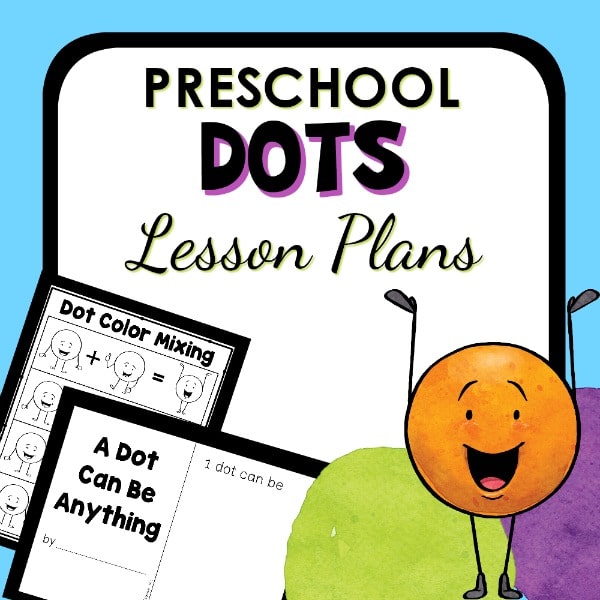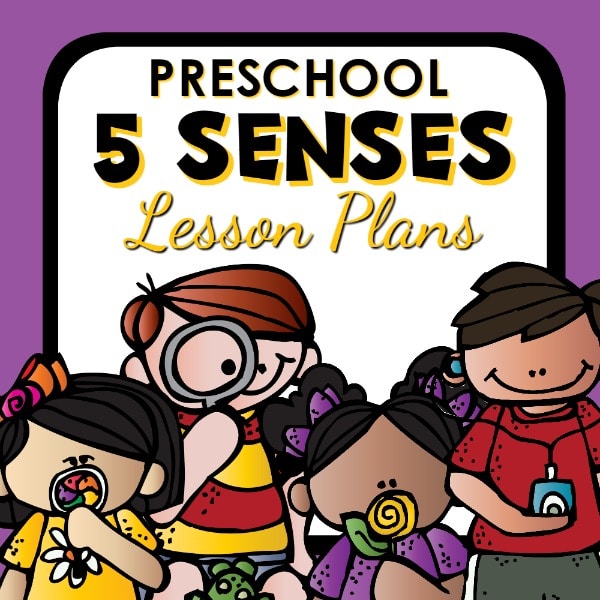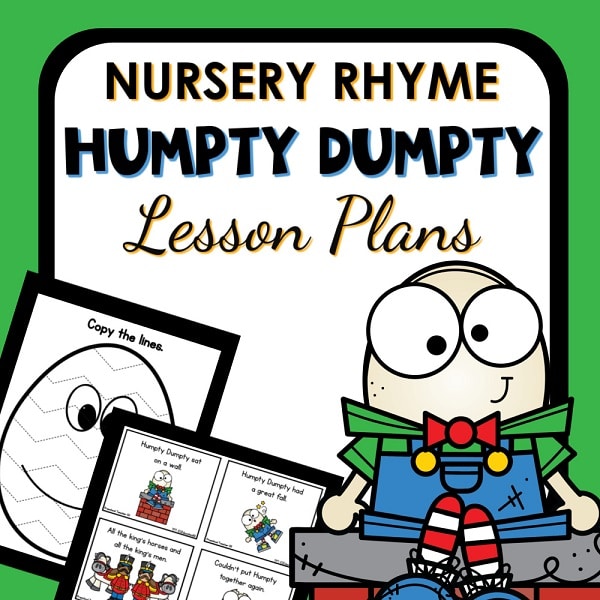With all the messy play ideas I share here on Fun-A-Day, it’s no surprise when I’m asked about the benefits of messy play. And, since I love all things messy play, I am more than happy to chat about why it’s so important for kids!
So I thought I’d put all of my reasons in one handy-dandy spot for future reference. This way, I can explain the benefits in-depth for you. You can pull it up when you’re chatting with your mess-averse colleagues, or when your students’ families have questions. Or when you need a little push to let the kids get messy.
Because mess is a part of childhood, and life really. So why not embrace it and channel it into messy fun that serves the kids well?
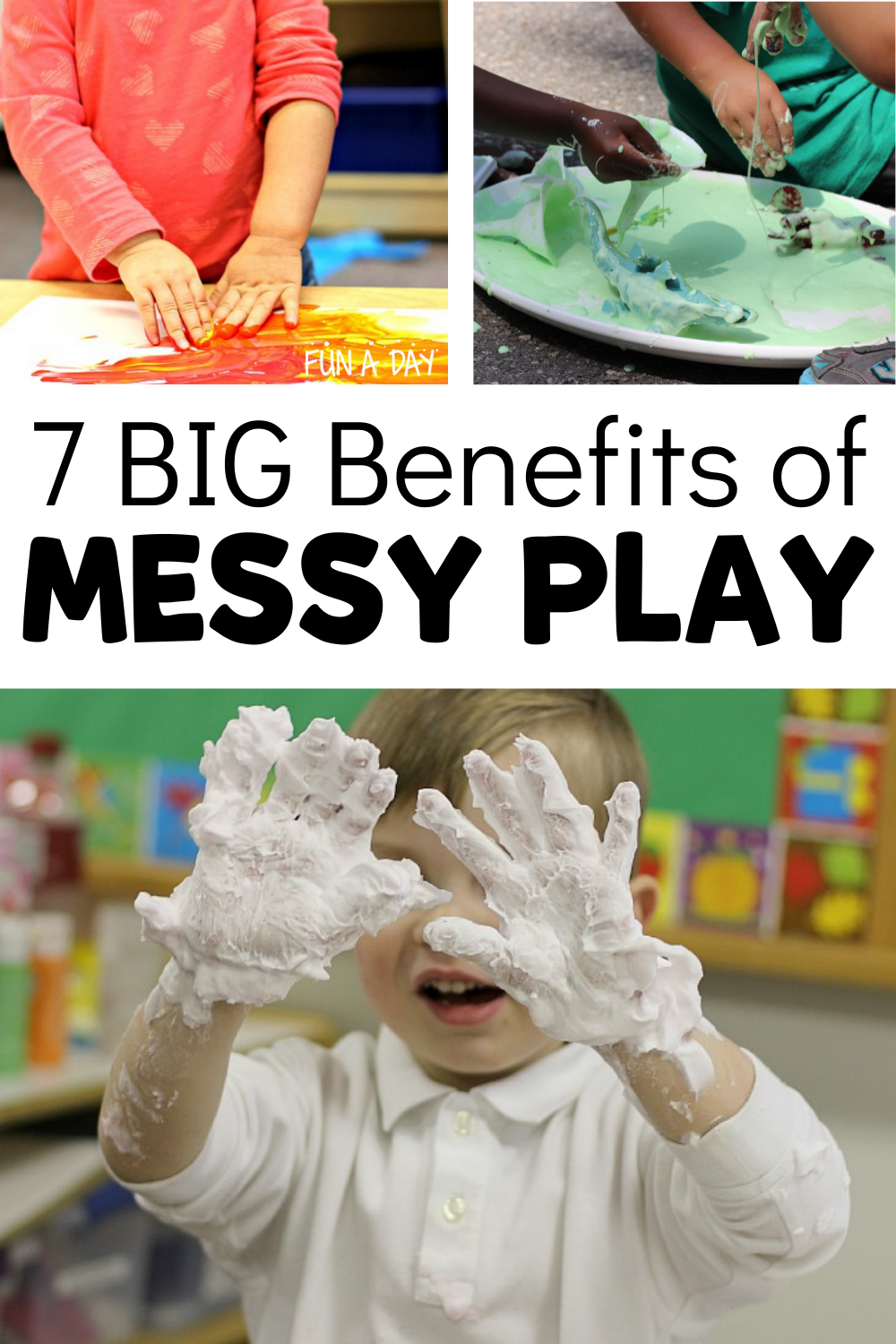
Below I’m going to touch on 7 big reasons that messy play is important for preschoolers. I do want to point out that it’s NOT just important for the little ones, though. Older children can reap a lot of rewards when it comes to messy experiences. So don’t negate the needs of elementary, middle, and high school children either! Honestly, adults can benefit from it, too!
Benefits of Messy Play
Now let’s take a look at why messy play is such a big deal. As I mentioned above, I’m sharing 7 really big reasons it’s important. There are seriously so many benefits to messy play that I didn’t want to overwhelm you.
So I made a giant list, and then I went back and consolidated everything under 7 topics. Many of the topics touch on aspects of child development because that’s one of the big benefits of messy play – it encourages development on multiple levels.
I feel like every single item on my humongous list fits within these categories. If I left anything out, feel free to drop it in the comments for me!
Messy Play Supports Cognitive Development
Cognitive development, in a nutshell, is the development of thought processes and learning. When we talk about cognitive development, we’re referencing thinking, problem-solving, learning, etc.
And messy play most definitely encourages the kids’ cognitive development! Here are a few ways it does so:
- Children practice decision-making as they decide what materials to combine and what to create or play with next.
- Kids have to problem-solve when their messy science experiment is getting a bit out of hand.
- They learn that yellow and blue create green as they’re mixing up paint for some messy art.
- Critical thinking is inherent to messy play as kids observe, analyze, and identify things to change.
- Students learn about science as they experiment, observe gravity’s effect, watch chemical reactions, etc.
- Math is touched on as kid count, classify, measure, and so much more.
So the next time someone asks why you’re letting the kids get messy, explain that it’s to help grow their brains!
Messy Play Fosters Language Development
Another one of the benefits of messy play is it gives the kids the chance to practice language skills. And that’s not a small matter in preschool, right?
Language development refers to things like vocabulary, speaking in words and sentences, communicating verbally and non-verbally, and receptive language.
Here are some ways language development shows up during messy play activities:
- A child labels all the colors of the finger paint they’re using.
- Kids use various descriptive words when talking about the texture of a sensory bin they’re exploring.
- The children work together to describe the imaginative play they’ve woven into a sensory experience.
- One child tells their peers about what might happen next during a messy science experiment.
- You give the students two-step directions for setting up a messy experience and they follow along.
- Toddlers deeply immersed in some messy fun point to tools they want to use next.
Anyone who’s observed children fully engaged in a messy invitation can see (and hear!) the language development happening all the time! It’s one of my favorite things to do, especially when the kids start weaving in made-up stories to go along with their play.
Messy Play Encourages Physical Development
We can’t talk about the benefits of messy play without touching on kids’ physical development! This generally refers to children’s abilities to use and control their bodies. So things like fine motor skills, gross motor skills, and using their senses are wrapped up in physical development.
Here are some ways messy play helps out in this area:
- Kids use their pincer grasp to carefully add seeds to their pumpkin seed slime.
- They dance and jump and stomp with freeze dance painting.
- Little hands are strengthened as they squeeze bottle of vinegar during rainbow science, or as they knead and manipulate play dough.
- As they’re making scented shaving cream art, the children are using their senses of touch, sight, and smell.
Every messy experience you set up for your students has some element of sensory input and movement. So physical development is inherent in all the messy fun you create with the kids.
Messy Play Promotes Social and Emotional Development
In my mind, this one of the most important benefits of messy play. Because preschool is really about social and emotional development for children. It’s the backbone of all the learning they’ll do throughout their lives. And these skills are incredibly important as they navigate through life.
Here are a few ways messy play helps kids as they grow socially and emotionally:
- Children have to practice taking turns with their peers as they play.
- There’s tons of practice in delayed gratification, as the kids have to wait until someone else is finished with a tool before using it.
- You have basic rules in place for your messy play activities, and the kids learn to follow those rules along the way.
- Messy play allows for both cooperative and independent play. Both of which are important for young children to learn.
- Self-regulation comes into play often during messy play!
- You can help your students with conflict resolution right in the middle of a messy experience.
I feel like I could go on and on with examples here! But I’m trying not to list out the hundreds of ways young kids practice social-emotional skills during messy experiences.
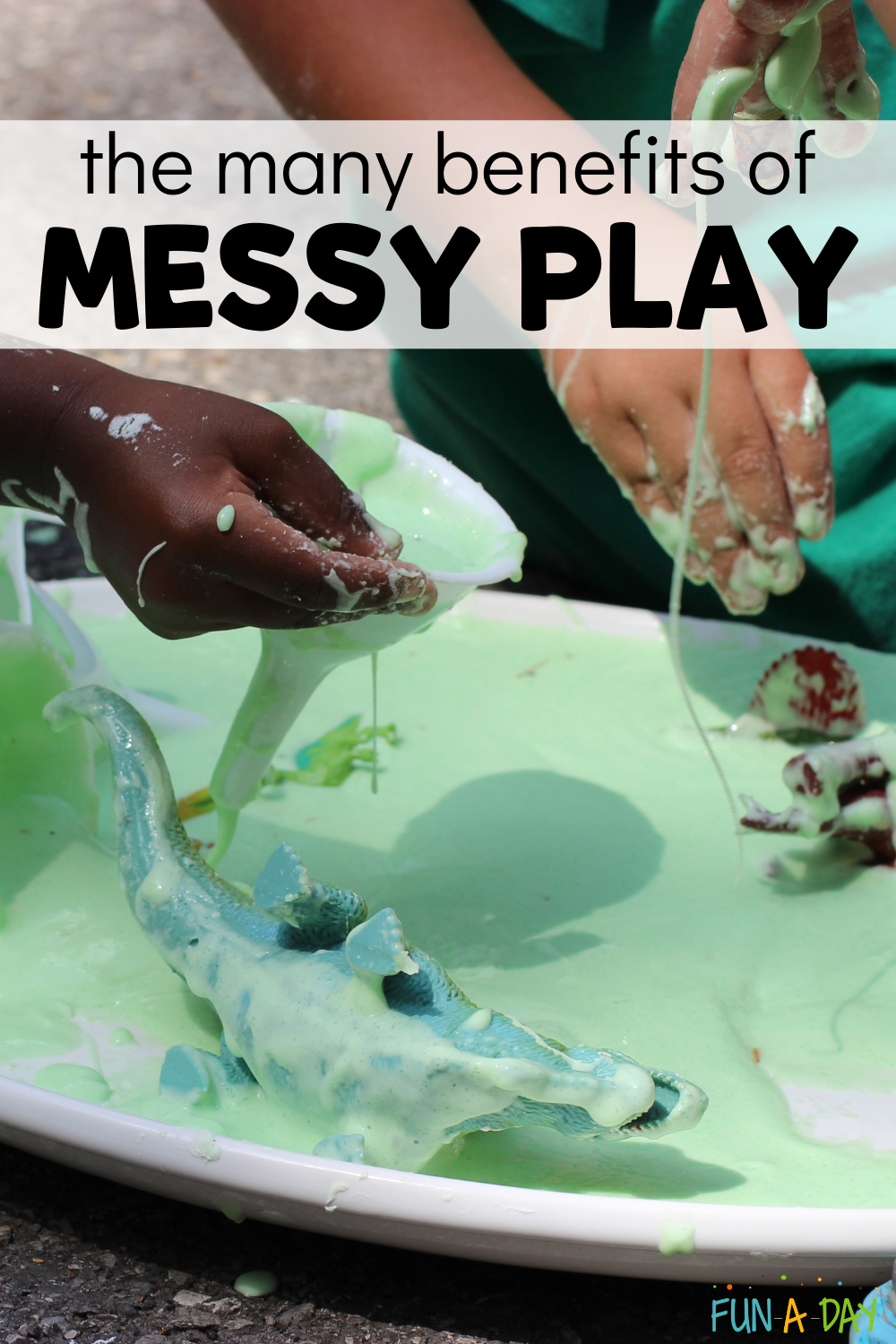
Messy Play Allows for Life Skills Practice
Another one of the benefits of messy play – it encourages children to practice skills they’ll use throughout their life. And this practice is done in a safe, playful way. Your students can make mistakes as they practice and that’s not a problem at all!
Here are some ways life skills are integrated into messy play:
- Kids pour and scoop as they’re playing in messy sensory bins.
- They practice concentration as they get their messy art just the way they want it.
- Resilience-building opportunities abound in messy play!
- And I cannot stress this one enough: kids learn and practice how to clean up after themselves quite a bit!
Some of the life skills have been mentioned when I chatted about other messy play benefits, too. Things like fine motor skills, which are incredibly helpful when it comes to buttoning clothes.
Messy Play Nurtures Creativity
Another one of the big benefits of messy play is that it lets kids be creative in their own ways. Creativity is defined as “the ability to produce or use original and unusual ideas.”
Kids aren’t constrained to doing things just one way during messy invitations. In fact, there really isn’t a “right way” for kids to interact with those invitations! Because messy play is, at heart, open-ended.
Here are a few examples of creativity in messy play:
- When using sidewalk chalk paint, one child decides to create a “rainbow circle.” Another experiments with pouring the paint over a branch found on the ground.
- Some kids exploring international mud day activities paint with the mud, while others drive toys in it. And still others take their socks off and stomp in the mud.
- A simple water sensory bin leads to children inventing new ways to get water from one end of the table to the next.
- When creating splat art, a few children are focused on dropping pompoms from various heights while others want to see how to combine the splats to make new colors.
- A messy experiment isn’t yielding the expected results, so the kids have to creatively problem solve to determine why.
As I said earlier, messy play is open-ended. So that leaves it up to each individual child to put their own spin on things. Which leaves things wide open for creativity!
Messy Play is Fun and Engaging
The final item on my list of the benefits of messy play is that it is FUN! Sometimes we adults get so wrapped up in all the questions:
- Are the kids developing appropriately?
- Have I taught them enough about colors?
- Do the kids know their letter sounds?
- But what are they learning?
And I’m not discounting those questions we teachers and parents have running through our heads. We want the best for our kids, both our own children and those we teach. So it’s natural to ensure that they’re learning and developing at an appropriate pace.
However, we cannot forget that fun has a place in childhood (it has a place in adulthood, too, really!). Fun means enjoyment and engagement and giggles. Fun also means learning and exploring and experimenting. The kids are going to learn as they engage in fun, hands-on play and activities. I promise!
That element of fun is just as important as the learning. Which is why I made sure it had its own spot on my list.
Now that I’ve shared the details about why messy play is important, I’d love to hear from you! What are some of your favorite benefits of messy play? Leave them in the comments below. I can’t wait to hear your thoughts on the topic.
Done-For-You Preschool Resources
Let Preschool Teacher 101 save you a ton of planning time with fully-developed resources like lesson plans, digital games, circle time song packs, STEM challenges, dramatic play invitations, and much more. This way, you can focus on teaching and living your life (instead of spending hours upon hours planning).
Our world structure STEM challenge pack is kid-loved and teacher-approved. Click on the image below to get your own:
Our lesson plan packs always include multiple science, art, and sensory activities (along with weekly and daily lesson plans, book suggestions, and more). Click on the images below to read more:
Related Tools and Materials
If you’re just reading about all of the benefits of messy play, and you’re now ready to jump into the messy fun, here are some things to get you started:
- Preschool smocks
- Messy play mats
- Sensory bins and tables
- Hand-held broom and dustpan
- Washable paint
- Pluffle
- Kinetic sand
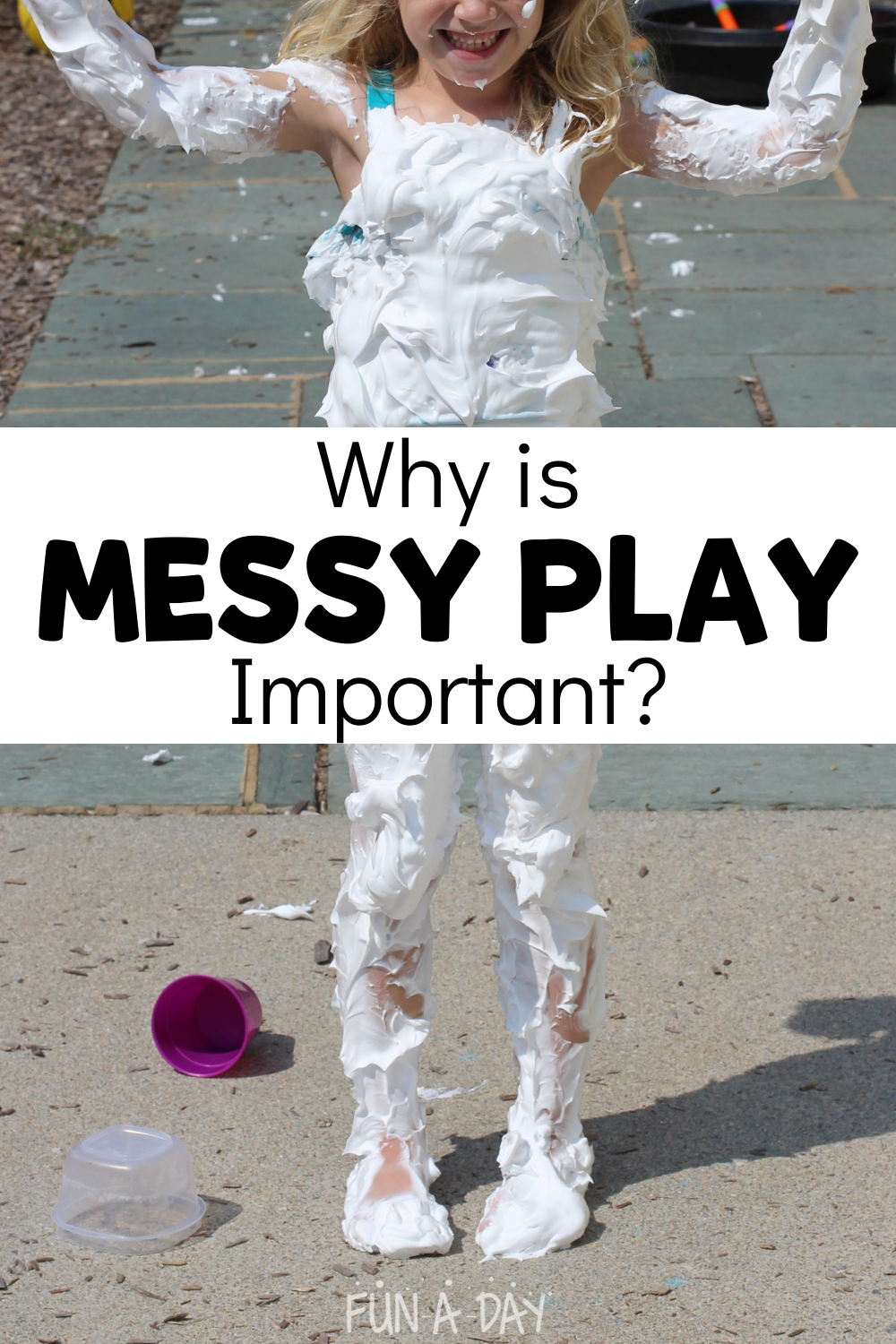
The post 7 HUGE Benefits of Messy Play appeared first on Fun-A-Day!.


